
|
|
|
|
|
National Association of Professional Band Instrument Repair Technicians |
Florida's Only Straubinger Certified Flute & Clarinet Pad Technician
|
Woodwind Repairs: |
Brass Repairs: |
|
Complete overhauls and restorations of Flutes, Piccolos, Clarinets, Oboes, Saxophones and Bassoons Crack Pinning and Smoothing of Imperfections in Bore Straubinger™ Certified Flute and Clarinet Pad Technician Custom Key Work * Bassoon Tenon String Rewrapping Tone Hole Facing, Undercutting & Replacing Saxophone Mouthpiece Repair, Refacing, Chamber Work & Replating Tenon Replacement & Joint Refitting Tone Hole, Bore & Bell Modification to Improve Pitch & Timbre Custom Made Dial Gauge to Measure the Tip of Sax & Clarinet Mpcs. |
Immaculate Soft-Soldering & Silver-Soldering Trombone Slide Specialist * Dent Work * Amado Water Keys 4 Way Valve Alignment * Replating of valves, slides, etc. Chem-cleaning, polishing, silver and gold plating Complete restorations and refinishing of all brass instruments Installation of 3rd Slide Triggers on Flugelhorns Complete set of MDRS, Magnetic Dent Removal System French Horn rotor lost motion removal Complete Machine Shop including Lathe, Milling Machines, and more |
Please scroll down for further information regarding woodwind and brasswind repairs!
I offer a
full range of repair services on all woodwind and brasswind instruments from student to
professional level. Every instrument I work on receives the greatest care
and I use the very best parts, tools, and materials available. I focus on
providing the finest quality repairs, with an extreme attention to detail, to
provide the performing artist the highest level of satisfaction with their
instrument. I try very
hard to
stay on the cutting edge of technology to improve my craft and to develop
my skills to the highest ability, yet still maintaining an Old-World work ethic
rarely found these days. Because I am a one-person shop, you can
be assured that I am the only one handling your instrument!
Although I am based in Fort Myers, my clients include the faculty and students of the University of Miami, Florida International University, New World School of the Arts in Miami, Miami-Dade Community College, musicians from the Naples Philharmonic and Southwest Florida Symphony, as well as students and professionals from around the world.
I have been professionally repairing musical instruments for 17 years and have built a solid reputation in Florida both as a full-time professional musician and as a repair technician. I believe that my experience as a multi-instrumentalist (please read About Me for more information regarding my training, education and professional playing experience) has given me a unique insight into all the different instruments and has helped me to better understand what players expect from their instruments. I take great pride in every repair that I do and I try to be as fair as possible in my pricing structure so that everyone can have their instrument set up the way they wish.
Please let me know if you have any questions and I will be happy to help you in any way that I can! Here is some information regarding repairs that I perform as well as materials and techniques that I use:
For
trumpets and flugelhorns,
I offer chem-cleaning; frozen slide and valve removal & restoration;
brush and satin finishing; spot plating or tank plating of small parts in
silver, nickel, black nickel and gold (and other metals upon request);
thorough 4-way valve alignments (up & down as well as side to side with the
use of the traditional mirror plus a fiber-optic scope) using either
factory original parts or synthetics at your request (synthetics don't compress
as much as organic material or rubber and some factory original parts are synthetic
already); dent removal and bell straightening; and many other
services. I also install 3rd slide triggers on flugelhorns as well as
other enhancements at your request. TIP: For those of you who
wash out your own instruments, make sure you thoroughly get all of the water out before
you reassemble the horn. Compressed air works very well and it's very
important because most water supplies contain chlorine, fluoride, other metals,
sulphur, and even softened water contains salt which is highly corrosive.
Using distilled water and blowing the horn out with an air compressor is best
and that way you wont discover green residue a few days after cleaning.
Trombone slides are one of my specialties! I utilize a procedure that is like a combination of a Texas flush in combination with the Slide Doctor's treatment to get the most buttery slide action possible! I can use Teflon, Super Slick, Slide-O-Mix or whatever the player prefers, or I can leave it dry for the player to add their own special magic formula. I also carefully burnish out any dings and check the slide assembly alignment to make sure that it is parallel and not skewed. If it is, then I do whatever is necessary (sometimes having to unsolder, align, then resolder the assembly) to make sure that the inner and outer slides are perfectly parallel and the action is flawless.
For piccolos, oboes, and clarinets, I prefer to use cork pads (although I occasionally use Gore-tex for certain clarinet keys) and I also use premium double-skin pads with firm needle felt where appropriate. The finest non press-filled sheet cork is used for tenons and key corks, and either Teflon or very thin bonded cork for all contact points and sliders. I also undercut, reface or replace tone holes if necessary, pin or seal cracks, lock loose posts, refit or replace tenons, silver-solder broken keys, remove lost motion from keys, and much more.
Bassoons
normally receive the traditional white-leather pads, treated with a water-proof
sealant that provides a nice touch while allowing the instrument to seal
perfectly. I also seal the bore (utilizing a paraffin wax treatment) and can repair rotted boot
joints. Other bassoon repairs include: bocal dedenting and
straightening, connecting rod replacement, key extensions, seat-strap and hand
crutch installation, string rewrapping of tenons, and
any other modifications you would like.
On flutes I currently like to use either premium double-skin pads, Valentino Green-back pads or Straubinger pads. Currently I am Florida's only certified Straubinger flute and clarinet pad technician and I highly recommend these pads as they are the most stable pads on the market. Some people have complained of the skins tearing but I believe that if the tone holes are prepared properly, and the player gets used to a light touch, then the skins will last a long time. They have an incredible feel and because of their stability you can adjust the mechanism to have the lightest touch with a perfect seal. I also offer pads such as: Lucien Deluxe, Pisoni, Valentino synthetic (I coat these with teflon to help reduce sticking), Yamaha OEM, Haynes OEM, Powell OEM (made by Straubinger), Schmidt gold-surface (very expensive!), Star brand and many others. I also do custom headjoint cutting, dedent flute bodies and headjoints, remove lost motion from keys, solder keys and tone holes, refit tenons and sockets, make custom tone hole inserts to improve response and intonation, as well as a myriad of custom repairs upon request.
For
saxophones, I
perform a variety of repairs to make them play better than ever! Some of
the work that I do includes: mouthpiece repair, refacing, refinishing, and chamber
work, including converting a mouthpiece to the specs of another (e.g. converting
a newer Otto Link to have the same facing and chamber as a Guardala Michael
Brecker model); neck taper and tenon resizing; dedenting of neck, body, and keys; soft
soldering or silver soldering of keys, ribs, and posts; tone hole refacing,
resizing, and general adjustment based on acoustical preferences; custom
key work; and matching the right pad and resonator combination with the player. I always make sure to
measure the proper thickness pad for each instrument and I will select the firmness of pad based on your playing style and
personal preference. I will install the resonator of your choice from
the following:
Reso-Tech
or Beason Domed Metal: These use a screw and washer to install and are available in brass,
nickel-plated brass, or sterling silver. These are my favorite because
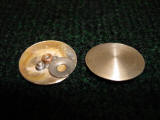 they are
reusable and are similar to the original Selmer "Tone-X" domed-resonators found
on old Super Actions and early Mark VI's. The "Tone-X" also used a screw
and washer to attach them but were made of nickel plated brass. These are
highly sought after and if you have them on your horn make sure that anybody who
does repair work will not remove them and throw them away!!!!! I have
heard many horror stories about this happening and the "Tone-X" resonators are
no longer available. The Reso-Tech and Beason resos are the closest to the Tone-X and
are priced accordingly, usually adding about $100 - $130 to the cost of an
overhaul. The quality of these resonators is the very best that I have
seen and I believe the cost is well worth it . The Reso-Techs are
available in a variety of finishes (silver, nickel, etc) and the Beasons are
available in brass only and are a little thicker and more domed than the Reso-Techs.
they are
reusable and are similar to the original Selmer "Tone-X" domed-resonators found
on old Super Actions and early Mark VI's. The "Tone-X" also used a screw
and washer to attach them but were made of nickel plated brass. These are
highly sought after and if you have them on your horn make sure that anybody who
does repair work will not remove them and throw them away!!!!! I have
heard many horror stories about this happening and the "Tone-X" resonators are
no longer available. The Reso-Tech and Beason resos are the closest to the Tone-X and
are priced accordingly, usually adding about $100 - $130 to the cost of an
overhaul. The quality of these resonators is the very best that I have
seen and I believe the cost is well worth it . The Reso-Techs are
available in a variety of finishes (silver, nickel, etc) and the Beasons are
available in brass only and are a little thicker and more domed than the Reso-Techs.
Noyek (also
known as Hollywood or Star or Silva-Wave)
resonators which are wavy and made of solid brass, gold-plated brass, or
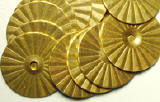 aluminum
(not my personal favorite as they tend to disintegrate over time due to the
aluminum composition). They look flashy and there have been claims of
increased tone projection. I currently stock the brass resonators but do
not stock the gold-plated or aluminum ones, but will gladly order them for you
if you prefer.
aluminum
(not my personal favorite as they tend to disintegrate over time due to the
aluminum composition). They look flashy and there have been claims of
increased tone projection. I currently stock the brass resonators but do
not stock the gold-plated or aluminum ones, but will gladly order them for you
if you prefer.
Domed stainless steel (or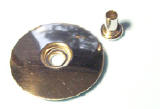 copper) either the
kind with the separate rivet (left pic) or the one-piece without the separate rivet
(right pic). The ones with the
rivet are
copper) either the
kind with the separate rivet (left pic) or the one-piece without the separate rivet
(right pic). The ones with the
rivet are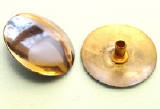 commonly found on new Selmers
(the Super Action 80 series II's and III's), Yanagisawas, and Keilwerths,
as well as a few of the Taiwanese horns like Jupiter, Antigua Winds,
L.A. Sax and others. The non-rivet resonators resemble the old "Baby Moon"
automobile hubcaps from the
50's. Choosing either rivet or non-rivet will not make a difference in
tone, only in appearance. My only complaint with these is that even though
they claim to be made of stainless-steel, they always rust, and the copper ones
turn green!
commonly found on new Selmers
(the Super Action 80 series II's and III's), Yanagisawas, and Keilwerths,
as well as a few of the Taiwanese horns like Jupiter, Antigua Winds,
L.A. Sax and others. The non-rivet resonators resemble the old "Baby Moon"
automobile hubcaps from the
50's. Choosing either rivet or non-rivet will not make a difference in
tone, only in appearance. My only complaint with these is that even though
they claim to be made of stainless-steel, they always rust, and the copper ones
turn green!
Plastic domed
resonators are on all models of Yamahas, as well as student line horns from
Selmer (their Reference models also have them), Yanagisawa, Keilwerth and many
others. They last forever, are really
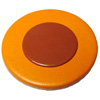 inexpensive
and do not detract from the sound at all. Some professionals prefer these
over the others because they claim that they don't add unwanted brightness to
the sound. I have no idea if this is true or not, all I know is that if
the horn seals well, it will play well and that the resonators don't really
resonate, they just reflect the vibrating air column off the pad.
inexpensive
and do not detract from the sound at all. Some professionals prefer these
over the others because they claim that they don't add unwanted brightness to
the sound. I have no idea if this is true or not, all I know is that if
the horn seals well, it will play well and that the resonators don't really
resonate, they just reflect the vibrating air column off the pad.
Of course, my all-time favorites are the original Selmer "Tone-X" resonators. These were machined from nickel plated brass and were installed with a small screw and washer. Although found on original Super-Actions and early Mark VI's, they are very hard to find today. I was blessed to have found a set of them (in the original "Tone-X" box from Selmer) in a tool kit from a retired repairman and therefore learned that they were called "Tone-X by Selmer". I have acquired many vintage saxes that still have them, as well as the original pads! I don't know how much they actually "resonate" but I know they are original equipment and I truly believe in keeping any instrument as original as possible, especially vintage instruments like old Selmers, Conns, Bueschers, Kings and other fine instruments.
Speaking of Buescher saxes, the original snap-in resonators are also very hard to find. If you have any of these, I would be greatly interested in acquiring them if you do not want them. Many customers have old Bueschers with the snaps missing, and I hate to replace them with anything but the original. Many repair technicians remove the snap-in resonators along with the snaps from the pad cups, so if you have any of the old resonators and would like to get rid of them, please let me know!
On all instruments that I repair, I do the very best to restore them to optimum playing ability. I try to keep them as original as possible, but sometimes the original equipment is inferior to modern day equivalents. In this case, I will consult with you about what you would prefer. In my own collection, I have many instruments that have all original equipment, and I am reluctant to change it because of it's pristine condition. Therefore, I try to keep vintage instruments as original as possible as long as they play well, but will change things as necessary to make them play better, but only after consulting you.
Tech nerds ONLY!!!! Click here for photo gallery pics of my shop set-up.
Feel free to email me with any repair questions!
![]()
Home About Craig Services Contact Info Weddings Audio Clips Video Clips
Song List Calendar Testimonials Craig's Faves Photo Gallery Links
miami, tampa, orlando, naples, south, southwest, west, new, york, jersey, hollywood, los angeles, california, tallahassee, fort, ft, myers, lauderdale, pierce, palm beach, florida, selmer, bach, yamaha, king, buescher, conn, powell, haynes, brannen, muramatsu, miyazawa, loree, fox, heckel, marigaux, covey, laubin, tenor, alto, soprano, sopranino, bari, baritone, bass, sax, saxophone, mark, mk, vi, 6, six, flute, clarinet, oboe, bassoon, trumpet, trombone, french, english, horn, woodwind, brasswind, musical, instrument, repair, repairs, technician, tech, specialist